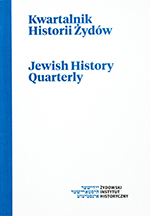Między judaizmem a islamem – rzecz o początkach karaizmu
Between Judaism and Islam—or the Origins of Karaism
Author(s): Marzena ZawanowskaSubject(s): Jewish studies, Theology and Religion, Islam studies, Jewish Thought and Philosophy
Published by: Żydowski Instytut Historyczny
Keywords: medieval Karaites; Karaism; Judaism; Islam; Qumran
Summary/Abstract: The origins of Karaism, the reasons for its inception, and the nature of this religious movement at the initial stage of its development are matters of ongoing academic dispute. Even the meaning of the name “Karaites” as well as the dating of their emergence on the stage of history are debatable. The paper surveys three major scholarly hypotheses concerning its provenance: 1. Judeo-centric, which indicates the similarities between the Judean Scrolls and medieval Karaite texts (especially in terms of exegetical methods and terminology), and on this basis claims the existence of a direct—historical or conceptual—connection between the Qumran sectarians and the Karaites; 2. Islamo-centric, which focuses on the parallels between Karaite and Muslim religious legislation and customs, as well as theological discourse, and emphasizes the Islamic context of split that occurred within the medieval Jewish world into Rabbanites and Karaites; 3. Finally, the so called “theory of fusion,” which offers a complex view of Karaism as an outcome of merging of various heterodox—both Jewish and Muslim—elements. The article assesses all these diverging views and attempts to find common grounds among them. It also shortly reviews the ideology advocated by the early adherents of Karaism—the rejection of the Oral Law, the diaspora, and the Aramaic language (as means of religious literary expression), and the consequent call for return to the Written Law, the Land of Israel, and the Hebrew language—and juxtaposes these theoretical “ideals” to historical reality, in which the Karaites produced their own Oral Tradition, most of them lived in diaspora, and many of them (at least throughout the Middle ages) composed religious texts in languages other than the “holy tongue.” The concluding conjecture is that probably thanks to its ability to compromise and adapt to the changing historical conditions, Karaism could survive as a separate religious grouping within the Jewish world for over a thousand years.
Journal: Kwartalnik Historii Żydów
- Issue Year: 257/2016
- Issue No: 01
- Page Range: 11-34
- Page Count: 24
- Language: Polish
- Content File-PDF

